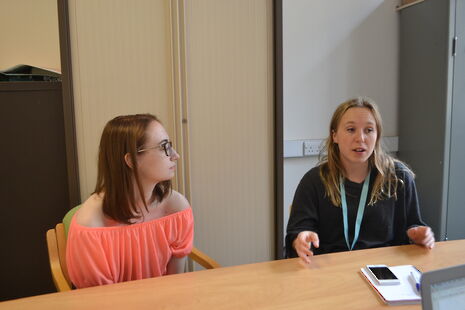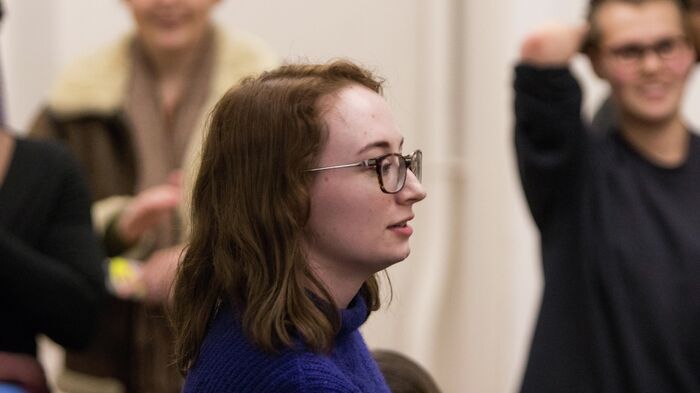CUSU presidents present and future discuss college inequality and Grudgebridge
Evie Aspinall and Daisy Eyre share their reflections and thoughts on leading Cambridge’s student union

Evie Aspinall is set to be the latest in a long succession of HSPS graduates to take up the mantle of CUSU president, as Daisy Eyre’s term draws to a close. Varsity sat down with the outgoing and incoming presidents to talk student engagement, college inequality and Grudgebridge.
Eyre reflects on the main obstacles that stood in the way of accomplishing some of her manifesto promises, branding the University’s pace of change as often “sluggish”. She views the role of CUSU president as not being “some kind of magic wand that is waved and Cambridge is amazing”, but in choosing key battles, to “push the University to do things you think are really important”.
The limited amount of time in a single presidential term became an issue when she tried to address the issue of unmanageable student workloads in Lent Term, one of the key points of her manifesto, because of the “unpredictable and incredibly important” extended staff strikes.
Addressing a lack of student engagement with CUSU was a priority of Aspinall’s throughout her presidential campaign. Beyond that, she sees the crucial policy issue of her term as tackling college inequality – from disparities in rent, down to intermission policies and tutorial support during Exam Term.
Aspinall outlines her desire to address the issue that from both financial and non-financial perspectives “if you go to John’s, your life is much easier than if you end up at Newnham.” Indeed, college disparities has been a persistent thread at Cambridge this year – on both roll-out of Prevent policy and on rent costs, Varsity investigations have found stark differences across the University.
Aspinall views Cambridge’s collegiate nature as both an opportunity and challenge for CUSU, as the separation between college administrations and the University enables both to “pass the buck”.
“I think it should really be about the people that are affected – my perception from Grudgebridge was that it never was”
Eyre points out, however, that the collegiate nature of Cambridge “could be the resource to make the strongest union ever because you have so many more capillary links to students” through the existence of JCR and college-level campaigning.
In theory she says, this means CUSU has access to “students in every college, who will be able to feed back to us what students are feeling”, but that the danger lies in how “students see their college making change and they don't see CUSU making change”, as JCR action may be more immediately visible.
“I’ve never seen an opportunity like this in Cambridge,” Eyre says, remarking on the level of student engagement with drinking societies. However, both Eyre and Aspinall view Grudgebridge, whose platform as a popular Facebook page has been mobilised this term to eradicate drinking societies, as a deeply flawed mechanism.
Aspinall is particularly critical of Grudgebridge’s refusal to attach content notes to worrying or potentially triggering posts, which may appear on students’ timelines.
“I think it should really be about the people that are affected – my perception from Grudgebridge was that it never was”, Aspinall says.
CUSU’s code of conduct, which the present and incoming sabbatical team have been collaborating on, will seek to harness the “mobilised student passion” that Eyre points to as having emerged out of Grudgebridge. The process, however, faces a predictably low level of broad engagement from drinking society members, with 25 members from a concentrated number of societies having signed up and fewer than ten expressing willingness to go to a meeting.
“There’s a certain extent to which drinking society members need to match words to actual actions and actually need to put some effort in, because otherwise I think that it will be quite clear that they’re not willing to make change”, Eyre tells me.
 News / Judge Business School advisor resigns over Epstein and Andrew links18 February 2026
News / Judge Business School advisor resigns over Epstein and Andrew links18 February 2026 News / Gov grants £36m to Cambridge supercomputer17 February 2026
News / Gov grants £36m to Cambridge supercomputer17 February 2026 News / Hundreds of Cambridge academics demand vote on fate of vet course20 February 2026
News / Hundreds of Cambridge academics demand vote on fate of vet course20 February 2026 News / CUCA members attend Reform rally in London20 February 2026
News / CUCA members attend Reform rally in London20 February 2026 News / Union speakers condemn ‘hateful’ Katie Hopkins speech14 February 2026
News / Union speakers condemn ‘hateful’ Katie Hopkins speech14 February 2026











